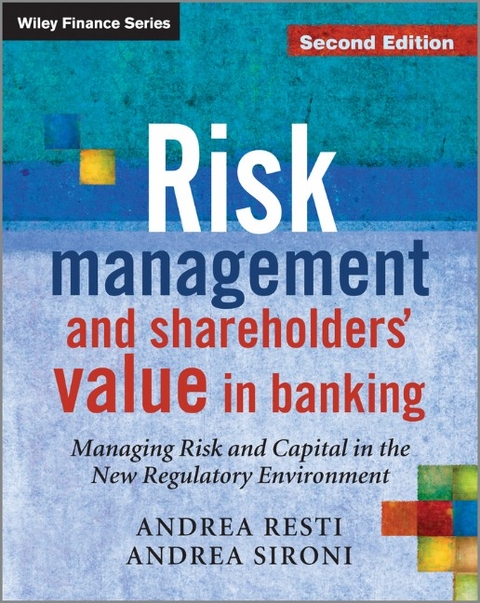
Risk Management and Shareholders Value in Banking
from Risk Measurement Models to Capital Allocation Policies
Seiten
2014
|
2nd Revised edition
John Wiley & Sons Inc (Verlag)
978-1-119-94214-6 (ISBN)
John Wiley & Sons Inc (Verlag)
978-1-119-94214-6 (ISBN)
- Titel wird leider nicht erscheinen
- Artikel merken
Risk Management and Shareholders' Value in Banking provides an integrated framework for risk measurement, capital management and value creation in banks covering interest rate risk; market risk; credit risk; operational risk; capital regulation; capital management; and value creation.
Updated to include coverage of the most recent developments in banking regulation, including comprehensive coverage of the new Basel III regulatory framework the book is structured in six parts. Part I covers the measurement and management of the interest rate risk and liquidity risk on all assets and liabilities of a banking institution. This includes a discussion of gapping models, presented critically through numerical examples and solutions, internal transfer rates, gapping techniques, liquidity risk management. Part II presents portfolio models for market risks, including the "variance/covariance" approach, Monte Carlo / historical simulations, backtesting, alternative risk measures (e.g. expected shortfall) and volatility estimation techniques. Part III addresses credit risk measurement, first on a stand-alone basis, then at a portfolio level; it also includes chapters on scoring models, rating systems, recovery risk, counterparty risk for OTC derivatives, and practical applications of credit risk models. Part IV deals with operational risk before part V goes on to illustrate the main pieces of regulation on bank capital issued by the Basel Committee, the main focus being on Basel 2 (insofar it has not been changed by the latest regulatory wave) and Basel 3. Part VI presents the link between risk and capital in all its implications, and provides the reader with the technical models needed to allocate capital to risk-taking units, set risk-adjusted profitability targets, and optimize the amount and composition of bank capital.
By bringing together the core aspects of risk management in banking - models and algorithms, regulation, process engineering and management, and strategic planning - the book provides a unique and consistent framework showing how financial risks can be understood, measured, managed and covered with capital.
The book is accompanied by a website which includes a series of excel files with detailed explanations of all the numerical examples shown in the book, as well as solutions to the end of chapter exercises.
Updated to include coverage of the most recent developments in banking regulation, including comprehensive coverage of the new Basel III regulatory framework the book is structured in six parts. Part I covers the measurement and management of the interest rate risk and liquidity risk on all assets and liabilities of a banking institution. This includes a discussion of gapping models, presented critically through numerical examples and solutions, internal transfer rates, gapping techniques, liquidity risk management. Part II presents portfolio models for market risks, including the "variance/covariance" approach, Monte Carlo / historical simulations, backtesting, alternative risk measures (e.g. expected shortfall) and volatility estimation techniques. Part III addresses credit risk measurement, first on a stand-alone basis, then at a portfolio level; it also includes chapters on scoring models, rating systems, recovery risk, counterparty risk for OTC derivatives, and practical applications of credit risk models. Part IV deals with operational risk before part V goes on to illustrate the main pieces of regulation on bank capital issued by the Basel Committee, the main focus being on Basel 2 (insofar it has not been changed by the latest regulatory wave) and Basel 3. Part VI presents the link between risk and capital in all its implications, and provides the reader with the technical models needed to allocate capital to risk-taking units, set risk-adjusted profitability targets, and optimize the amount and composition of bank capital.
By bringing together the core aspects of risk management in banking - models and algorithms, regulation, process engineering and management, and strategic planning - the book provides a unique and consistent framework showing how financial risks can be understood, measured, managed and covered with capital.
The book is accompanied by a website which includes a series of excel files with detailed explanations of all the numerical examples shown in the book, as well as solutions to the end of chapter exercises.
| Erscheint lt. Verlag | 16.5.2014 |
|---|---|
| Verlagsort | New York |
| Sprache | englisch |
| Maße | 187 x 235 mm |
| Themenwelt | Wirtschaft ► Betriebswirtschaft / Management ► Finanzierung |
| Betriebswirtschaft / Management ► Spezielle Betriebswirtschaftslehre ► Bankbetriebslehre | |
| Betriebswirtschaft / Management ► Spezielle Betriebswirtschaftslehre ► Versicherungsbetriebslehre | |
| ISBN-10 | 1-119-94214-4 / 1119942144 |
| ISBN-13 | 978-1-119-94214-6 / 9781119942146 |
| Zustand | Neuware |
| Informationen gemäß Produktsicherheitsverordnung (GPSR) | |
| Haben Sie eine Frage zum Produkt? |
Mehr entdecken
aus dem Bereich
aus dem Bereich
warum unser Geld stirbt und wie Sie davon profitieren
Buch | Hardcover (2024)
FinanzBuch (Verlag)
30,00 €
Erinnerungen des Chefökonomen
Buch | Hardcover (2024)
Vahlen (Verlag)
24,90 €


